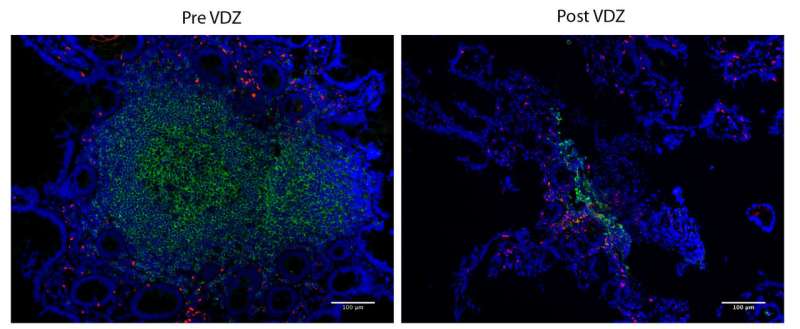Anti-integrin therapy effect on intestinal immune system in HIV-infected patients

In a study published today in Science Translational Medicine, Mount Sinai researchers describe for the first time a mechanism that may shrink collections of immune cells in the gastrointestinal (GI) tract, called lymphoid aggregates, where HIV may lay sequestered. These findings may be of interest to scientists who are involved in researching the cure for HIV infection in light of the strong role that the intestines play in it.
The study builds on research by the same team which found in 2004 that the intestines are specifically targeted by HIV at the earliest stage of infection. "We know from our earlier research that intestinal immune cells called CD4+ T cells are profoundly depleted during the earliest stages of HIV infection. Newer research from other groups has found that CD4 + T cells that migrate to the gut, and bear a receptor called a4b7, are highly susceptible to HIV," says Saurabh Mehandru, MD, Associate Professor of Medicine (Gastroenterology) at the Icahn School of Medicine at Mount Sinai and the senior author on this study. Dr. Mehandru directs an immunology lab, part of the Division of Gastroenterology at the Icahn School of Medicine. The Mehandru Lab studies mucosal immunology as it pertains to immune deficiency states such as HIV infection and inflammatory disorders, with inflammatory bowel disease (IBD) being a focal point.
"Now, 14 years later, we have discovered how anti-a4b7 therapy can significantly, and rather unexpectedly, lead to the attenuation of lymphoid aggregates," continues Dr. Mehandru. This is the first report of reduction in GI-associated lymphoid aggregates by a therapeutic intervention in patients with HIV-1 infection. "As such, these data describe a new mechanism of action of treatments targeting the a4b7 receptor and define a rational basis for the use of these treatments in HIV-1 infection and beyond," says Dr. Mehandru.
Study authors, led by Ph.D. student Mathieu Uzzan, designed a study that involved a cohort of six individuals with mild IBD and concomitant HIV-1 infection receiving anti-a4b7 treatment, specifically vedolizumab (VDZ). VDZ has become a frontline strategy in the management of patients with IBD, in whom it has demonstrated strong efficacy and an excellent safety profile. The investigators studied immune cells in the blood and the intestines and describe the immunological and virological effects of VDZ therapy over a 30-week period.
"The therapy was tolerated well, with only minor adverse events reported. We were surprised by the impact of treatment on lymphoid aggregates in the GI tract of patients with HIV-1 infection. We believe these initial findings could have significant implications for HIV-1 infection, perhaps in combination with other agents such as broadly neutralizing anti-HIV antibodies," says Dr. Mehandru.
Research was facilitated by scientists at the University of Hawaii, the Wistar Institute, the University of Montreal, and the University of Minnesota.
More information: M. Uzzan el al., "Anti-a4ß7 therapy targets lymphoid aggregates in the gastrointestinal tract of HIV-1–infected individuals," Science Translational Medicine (2018). stm.sciencemag.org/lookup/doi/ … scitranslmed.aau4711

















